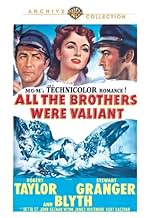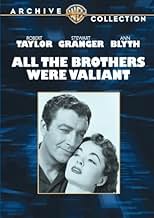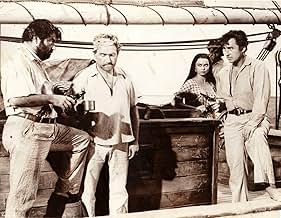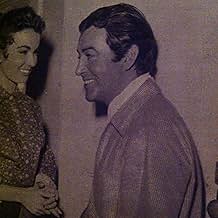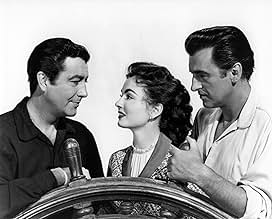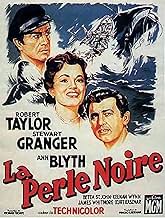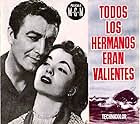CALIFICACIÓN DE IMDb
6.2/10
1.2 k
TU CALIFICACIÓN
En las islas del Pacífico Sur, dos hermanos, uno bueno y uno malo, luchan por la misma chica y por una bolsa de perlas.En las islas del Pacífico Sur, dos hermanos, uno bueno y uno malo, luchan por la misma chica y por una bolsa de perlas.En las islas del Pacífico Sur, dos hermanos, uno bueno y uno malo, luchan por la misma chica y por una bolsa de perlas.
- Dirección
- Guionistas
- Elenco
- Nominado a 1 premio Óscar
- 1 nominación en total
Frank DeKova
- Stevenson
- (as Frank deKova)
- Dirección
- Guionistas
- Todo el elenco y el equipo
- Producción, taquilla y más en IMDbPro
Opiniones destacadas
Taylor is captain of a whaling ship in the south Pacific. His wife, Anne Blythe, is also aboard to keep Taylor from getting too nervous. The crew are a mixed lot. Somewhere along the way Taylor's ship picks up Taylor's brother, Stewart Granger, who left home long ago to pursue various unsavory adventures, leaving behind a history of family friction.
Granger relates a tale of falling in with a couple of douche bags, Kurt Kaszner and James Whitmore, who show him a stash of pearls in the lagoon of an island inhabited by hostile natives. Before they can make off with the millions of dollars of rare pearls, the two miscreants are killed and Granger barely escapes alive.
Back aboard Taylor's ship, Granger invites him to forget about any past frictions and join him in getting the pearls. Forget the whaling business. It sounds pretty good to Anne Blythe, who has always had a bit of a crush on the roguish Granger, but Taylor's face is grim as he declares that he, the captain, will carry out the ship's mission, which is to kill whales.
Stewart seduces Blythe and incites a mutiny. That's the kind of guy he is. There is a knockabout fist fight, and Granger changes sides to fight side by side with his brother and -- well, medical discretion forbids the revelation of additional plot details, but, this being a 1950s movie, you can guess the ending.
Interesting to see Stewart Granger in the role of irresponsible and light-hearted adventurer, kind of an Errol Flynn role. Robert Taylor's acting makes a quantum leap in this film -- he manages to suggest two emotions at the same time. As an actress, Anne Blythe had a pretty voice.
The score is by Miklos Rozsa. You can tell from the moment that first signature six-note phrase appears. We're told Rozsa was a musical prodigy. There's no reason to doubt it, but he recycled the same tone and even the same melodies from one movie to the next. Dmitri Tiomkin was also distinctive, but you can tell one score from another. "The Guns of Navarron" doesn't sound like "Red River." But here, if you close your eyelids, you find you're watching "Ben Hur" unroll on their interiors.
I hate to sound too sarcastic about this but it really is a dated by-product of the old Hollywood. It seems to have been ground out like a Sonic Burger. Everyone wears clean clothes. The men are closely shaved except those who look like supporting players and extras who have been instructed to grow beards so they look villainous. The tans are not from the weather but from Max Factor. After a monstrous gut-busting fist fight, nobody has a mark on him -- and this was after "Shane". The scenes aboard ship are studio bound. There's not a puff of wind.
Strictly routine.
Granger relates a tale of falling in with a couple of douche bags, Kurt Kaszner and James Whitmore, who show him a stash of pearls in the lagoon of an island inhabited by hostile natives. Before they can make off with the millions of dollars of rare pearls, the two miscreants are killed and Granger barely escapes alive.
Back aboard Taylor's ship, Granger invites him to forget about any past frictions and join him in getting the pearls. Forget the whaling business. It sounds pretty good to Anne Blythe, who has always had a bit of a crush on the roguish Granger, but Taylor's face is grim as he declares that he, the captain, will carry out the ship's mission, which is to kill whales.
Stewart seduces Blythe and incites a mutiny. That's the kind of guy he is. There is a knockabout fist fight, and Granger changes sides to fight side by side with his brother and -- well, medical discretion forbids the revelation of additional plot details, but, this being a 1950s movie, you can guess the ending.
Interesting to see Stewart Granger in the role of irresponsible and light-hearted adventurer, kind of an Errol Flynn role. Robert Taylor's acting makes a quantum leap in this film -- he manages to suggest two emotions at the same time. As an actress, Anne Blythe had a pretty voice.
The score is by Miklos Rozsa. You can tell from the moment that first signature six-note phrase appears. We're told Rozsa was a musical prodigy. There's no reason to doubt it, but he recycled the same tone and even the same melodies from one movie to the next. Dmitri Tiomkin was also distinctive, but you can tell one score from another. "The Guns of Navarron" doesn't sound like "Red River." But here, if you close your eyelids, you find you're watching "Ben Hur" unroll on their interiors.
I hate to sound too sarcastic about this but it really is a dated by-product of the old Hollywood. It seems to have been ground out like a Sonic Burger. Everyone wears clean clothes. The men are closely shaved except those who look like supporting players and extras who have been instructed to grow beards so they look villainous. The tans are not from the weather but from Max Factor. After a monstrous gut-busting fist fight, nobody has a mark on him -- and this was after "Shane". The scenes aboard ship are studio bound. There's not a puff of wind.
Strictly routine.
I have seen this movie several times and discover something new every time. One of the best things about this movie is the flashback sequence with Granger fighting pirates Whitmore and Kasznar for a bag of pearls. The rest of the movie explains how he tries to get his brother [Taylor] to them back from the lagoon where they were lost. You will need to see this movie at least two times before you understand all of the hidden plot twists.
Really did like the idea of the story and who doesn't like a good old adventure yarn once in a while? The cast is an agreeable one, although Robert Taylor was a bit hit and miss for me as an actor depending on the role on paper this sounded like a role that would suit him well. Stewart Granger and Ann Blyth were always watchable, as was Lewis Stone (here sadly in his last film). Richard Thorpe to me was a competent director but at times an undistinguished one.
'All the Brothers Were Valiant' was somewhat disappointing unfortunately, and am taking no pleasure in saying this being somebody that really wanted to like it very much. It is definitely worth a one-time watch and has a lot of fine things. 'All the Brothers Were Valiant' also, considering such a stirring title and that the idea was great, could have been a lot better, with the drawbacks being a fair few and sadly quite big.
Will start with the good things. 'All the Brothers Were Valiant' is a great looking film with the expense showing. Would actually go as far to say that the Technicolor photography in particular is stunning, very lavish and sweeping. Nearly forgot to mention Miklos Rosza as being another interest point, a great film composer with an immediately recognisable compositional style. Which one can definitely hear here in 'All the Brothers Were Valiant', it's arresting from the very first note and is typically lush with some nice grandeur and atmosphere.
It as a film starts off very well and the action oriented scenes are colourfully staged. The bag of pearls flashback is agreed the story highlight. Most of the cast do really well. Taylor's role suits him really well and plays to his strengths, he's on good form here. As is Granger, a nice rivalry contrast to Taylor. The supporting cast are very good, especially Peter Whitney.
However, Blyth fares a lot less well. She has next to nothing to work with, or anything that stands out, and she looks as if she knew that in a performance that doesn't show that much effort. The romantic chemistry came over as bland and watery. Stone does decently and is typically reserved in his cameo but he deserved a better final film and a bigger role. The script is pedestrian and overwrought.
Likewise with the romantic element of the story, which generally after a promising start gets very silly to suspending disbelief level and predictable. Do agree that the ending does undo the film quite badly, it's ridiculous and not remotely plausible. It was like the writers didn't know how to end the story so came up with what was forced upon them. Thorpe's direction gets the job done but too often, especially dramatically, it's undistinguished and like his heart wasn't completely in it.
Bottom line, watchable but doesn't have enough to it to rise above average. If only the rest of the film lived up to its promising start and good potential. 5/10
'All the Brothers Were Valiant' was somewhat disappointing unfortunately, and am taking no pleasure in saying this being somebody that really wanted to like it very much. It is definitely worth a one-time watch and has a lot of fine things. 'All the Brothers Were Valiant' also, considering such a stirring title and that the idea was great, could have been a lot better, with the drawbacks being a fair few and sadly quite big.
Will start with the good things. 'All the Brothers Were Valiant' is a great looking film with the expense showing. Would actually go as far to say that the Technicolor photography in particular is stunning, very lavish and sweeping. Nearly forgot to mention Miklos Rosza as being another interest point, a great film composer with an immediately recognisable compositional style. Which one can definitely hear here in 'All the Brothers Were Valiant', it's arresting from the very first note and is typically lush with some nice grandeur and atmosphere.
It as a film starts off very well and the action oriented scenes are colourfully staged. The bag of pearls flashback is agreed the story highlight. Most of the cast do really well. Taylor's role suits him really well and plays to his strengths, he's on good form here. As is Granger, a nice rivalry contrast to Taylor. The supporting cast are very good, especially Peter Whitney.
However, Blyth fares a lot less well. She has next to nothing to work with, or anything that stands out, and she looks as if she knew that in a performance that doesn't show that much effort. The romantic chemistry came over as bland and watery. Stone does decently and is typically reserved in his cameo but he deserved a better final film and a bigger role. The script is pedestrian and overwrought.
Likewise with the romantic element of the story, which generally after a promising start gets very silly to suspending disbelief level and predictable. Do agree that the ending does undo the film quite badly, it's ridiculous and not remotely plausible. It was like the writers didn't know how to end the story so came up with what was forced upon them. Thorpe's direction gets the job done but too often, especially dramatically, it's undistinguished and like his heart wasn't completely in it.
Bottom line, watchable but doesn't have enough to it to rise above average. If only the rest of the film lived up to its promising start and good potential. 5/10
Another commenter mentioned the un-likelihood of a whaler captain taking his bride on a projected three-year voyage.
In fact, sailors, a generally superstitious lot, often found women on a ship to be a jinx.
Then, too, today the very act of whaling is so P non-C that a lot of people will object to that aspect, rather than concentrating on the fact the story is set at a time no one saw a particular problem with killing the sea-going mammals for their oil.
Robert Taylor gives one of his best performances; Stewart Granger comes across very well.
Ann Blyth has some good scenes, and some bad ones, but she does them all well.
One really attractive aspect of "All the Brothers" is a superb supporting cast. Peter Whitney, for example, has one of his best roles in a very long career. He too often plays a dumb or bumbling character, but here he is a strong person in a pivotal position.
Leo Gordon has a smaller role, but he stands out, as does John Lupton, in a larger part.
Frank DeKova (whom I met on the set of "Johnny Firecloud") was a superb character actor but who was too often relegated to small roles. He could have been a bigger star, with his talent, but he was recognized by his peers, anyway.
The great Glenn Strange and the great John Doucette were aboard, adding their enormous talents and, as so often true in Hollywood, not getting screen credit.
Come to think of it, this movie is worth watching just for the great cast. But be prepared to suspend your disbelief, and don't look at the blue eyes of the "native girl."
In fact, sailors, a generally superstitious lot, often found women on a ship to be a jinx.
Then, too, today the very act of whaling is so P non-C that a lot of people will object to that aspect, rather than concentrating on the fact the story is set at a time no one saw a particular problem with killing the sea-going mammals for their oil.
Robert Taylor gives one of his best performances; Stewart Granger comes across very well.
Ann Blyth has some good scenes, and some bad ones, but she does them all well.
One really attractive aspect of "All the Brothers" is a superb supporting cast. Peter Whitney, for example, has one of his best roles in a very long career. He too often plays a dumb or bumbling character, but here he is a strong person in a pivotal position.
Leo Gordon has a smaller role, but he stands out, as does John Lupton, in a larger part.
Frank DeKova (whom I met on the set of "Johnny Firecloud") was a superb character actor but who was too often relegated to small roles. He could have been a bigger star, with his talent, but he was recognized by his peers, anyway.
The great Glenn Strange and the great John Doucette were aboard, adding their enormous talents and, as so often true in Hollywood, not getting screen credit.
Come to think of it, this movie is worth watching just for the great cast. But be prepared to suspend your disbelief, and don't look at the blue eyes of the "native girl."
This swashbuckling yarn pits Robert Taylor and Stewart Granger against each other as brothers who have very different ideas about how to captain a ship. There's mutiny, island lasses, palm trees, and lots of that flat, too-bright lighting common to Technicolor films from the 1950s. George Folsey received his billionth Oscar nomination for the film's color cinematography, but I'm guessing it was more for capturing some pretty ocean scenery than it was any artistic decisions.
Ann Blyth gives a sub-par performance as Taylor's wife who comes along for the sea voyage. She's a boring character and her presence teeters the film too often into romantic melodrama, when what we really want is more macho battle of wills.
Grade: B-
Ann Blyth gives a sub-par performance as Taylor's wife who comes along for the sea voyage. She's a boring character and her presence teeters the film too often into romantic melodrama, when what we really want is more macho battle of wills.
Grade: B-
¿Sabías que…?
- TriviaFinal film of Lewis Stone (Capt. Holt), who died in September 1953, two months before the film was theatrically released.
- ErroresWomen aboard ship were considered bad luck all through the sailing ship days. The superstition even extended part way into the modern era. Crews were known to resist sailing on ship that was to have a woman aboard.
- ConexionesRemake of Across to Singapore (1928)
Selecciones populares
Inicia sesión para calificar y agrega a la lista de videos para obtener recomendaciones personalizadas
- How long is All the Brothers Were Valiant?Con tecnología de Alexa
Detalles
Taquilla
- Presupuesto
- USD 1,816,000 (estimado)
- Total a nivel mundial
- USD 8,168
- Tiempo de ejecución1 hora 35 minutos
Contribuir a esta página
Sugiere una edición o agrega el contenido que falta

Principales brechas de datos
By what name was All the Brothers Were Valiant (1953) officially released in India in English?
Responda

